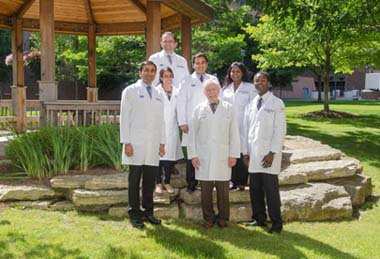Fellowship Program

Goals of the Fellowship Program
The Division of Gastroenterology offers a fellowship program designed to prepare physicians for careers in gastroenterology and hepatology. The program provides training and experience that develop the knowledge, skills, clinical competence and professionalism to expertly evaluate, diagnose, manage and treat inpatients and outpatients with gastrointestinal, hepatic, nutritional and GI oncologic disease. Fellows gain extensive experience in performing subspecialty consultations, gastrointestinal endoscopic and other procedures, and the performance of and interpretation of gastrointestinal and liver tests.
The fellowship seeks to provide experience and mentorship to develop clinician-educators and lifelong learners. Fellows acquire valuable experience in the preparation and presentation of lectures and seminars. They are involved in teaching medical students and residents. The fellowship also provides opportunities and mentorship in the principles of basic science and clinical research to encourage the development of academic gastroenterologists.
Program Experience
The three-year fellowship provides a wide variety of clinical and research opportunities in the Wayne State University affiliated hospitals: Harper University Hospital, Detroit Receiving Hospital, Karmanos Cancer Center, Hutzel Women's Hospital, and the Detroit Veterans Affairs Medical Center.
The diverse array of affiliated institutions provides an unquestioned source of strength for the training program in relation to the breadth of clinical pathology encountered by trainees. That the program is able to attract patients from across the state of Michigan into a single centralized urban tertiary medical campus provides ease of mind for trainees and faculty alike. The plethora of pathology is indeed a direct derivative of the exposure to diverse and distinct patient populations drawing from communities ranging from urban to rural with varying levels of socioeconomic resources. Applicants with an interest in addressing healthcare disparities and serving the underserved will find ample support for their endeavors during training and as a career focus into the future. Ultimately, graduates from the program can expect to be prepared for a career in any practice environment setting.
As a supplement to the excellent clinical education there are 2-3 formal educational conferences each week throughout the year, including clinical, basic science, research, radiology, pathology conferences and journal clubs.